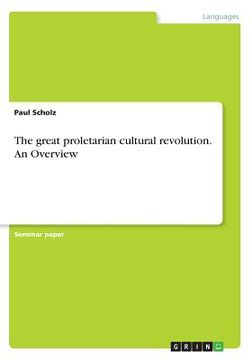Compartir
The great proletarian cultural revolution. An Overview (en Inglés)
Paul Scholz
(Autor)
·
Grin Verlag
· Tapa Blanda
The great proletarian cultural revolution. An Overview (en Inglés) - Scholz, Paul
$ 29.93
$ 37.90
Ahorras: $ 7.97
Elige la lista en la que quieres agregar tu producto o crea una nueva lista
✓ Producto agregado correctamente a la lista de deseos.
Ir a Mis ListasSe enviará desde nuestra bodega entre el
Lunes 20 de Mayo y el
Martes 21 de Mayo.
Lo recibirás en cualquier lugar de Estados Unidos entre 1 y 3 días hábiles luego del envío.
Reseña del libro "The great proletarian cultural revolution. An Overview (en Inglés)"
Seminar paper from the year 2016 in the subject Orientalism / Sinology - Chinese / China, grade: 1,3, Tsinghua University, language: English, abstract: The Chinese Cultural Revolution, also well known as the Great Proletarian Cultural Revolution - Wuchanjieji Wenhua Dageming, describes a unparalleled and from the top established revolution launched by Chinese Communist Party (CCP) chairman Mao Zedong during his very last period in power (1966-76) to restore the spirit of the Chinese Revolution (Lieberthal 2016). Mao Zedong during this time feared that China possibly could develop like the Soviet Russian nation did and he did not want China to follow their example. He was very concerned about China's and his own place in history and therefore did not hesitate to throw China's cities into chaos in a big effort to reverse the historic processes which were on their way obviously. Plenty of the events during this period of this time are without equal in the modern world's history. After the catastrophic Great Leap Forward, in which according to some sources more than 45 million people died, Mao Zedong decided to take a passive role in governing China. More practical and moderately oriented leaders, such as Vice-Chairman Liu Shaoqi and Premier Zhou Enlai, introduced soft economic reforms founding on individual incentives - such as allowing private people to farm their own land -an effort to rebuild and strengthen the heavily harmed economy (Leese 2016). Mao disliked such actions, as they went against the principles of pure communism in which he believed deeply. In fact, China's economy grew sustainably from 1962 to 1965 with the more conservative economic policies applying (Stanford 2001). [...]
- 0% (0)
- 0% (0)
- 0% (0)
- 0% (0)
- 0% (0)
Todos los libros de nuestro catálogo son Originales.
El libro está escrito en Inglés.
La encuadernación de esta edición es Tapa Blanda.
✓ Producto agregado correctamente al carro, Ir a Pagar.

